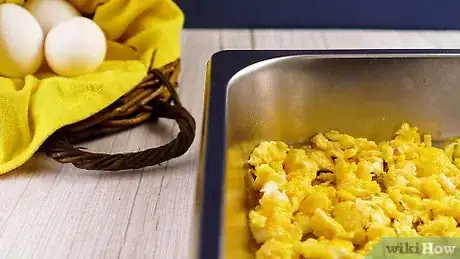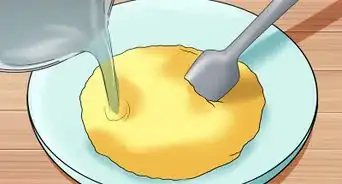This article was co-authored by wikiHow staff writer, Eric McClure. Eric McClure is an editing fellow at wikiHow where he has been editing, researching, and creating content since 2019. A former educator and poet, his work has appeared in Carcinogenic Poetry, Shot Glass Journal, Prairie Margins, and The Rusty Nail. His digital chapbook, The Internet, was also published in TL;DR Magazine. He was the winner of the Paul Carroll award for outstanding achievement in creative writing in 2014, and he was a featured reader at the Poetry Foundation’s Open Door Reading Series in 2015. Eric holds a BA in English from the University of Illinois at Chicago, and an MEd in secondary education from DePaul University.
The wikiHow Video Team also followed the article's instructions and verified that they work.
This article has been viewed 26,101 times.
Learn more...
Scrambled eggs are a key ingredient in any delicious breakfast. They’re versatile, can be mixed with other ingredients, and are able to be enjoyed in a variety of ways. Unfortunately, they tend to cool off quickly after they’ve been cooked. How you serve and eat your eggs impacts how fast they go cold. Generally speaking, you can keep eggs warm for up to 2 hours before they become a risk for foodborne illnesses. When reheating eggs, use an aluminum pan and direct heat, or toss them in the microwave for a few seconds.
Steps
Maintaining Heat in Cooked Eggs
-
1Store a small amount of eggs in a slow cooker to keep them warm. Pour your leftover eggs directly into your slow cooker. Put the lid on the slow cooker and turn the dial to the lowest heat setting. You can keep your eggs in the slow cooker for up to 2 hours after making them.[1]
- Eggs become susceptible to bacteria after they’ve been cooked. If you’re actively keeping them warm, they’ll go bad after 2 hours.
- This will dry your eggs out over time, but it’s the best way to keep a small batch of eggs from going bad and getting cold.
-
2Keep a large amount of eggs warm in the oven using the lowest heat setting. Transfer your eggs to an aluminum pan. Set the pan inside of your oven. Turn the oven on to the lowest heat setting available. On most ovens, this is around 170 °F (77 °C). Keep the eggs in your oven for up to 2 hours.[2]
- Like the slow cooker, the oven may dry your eggs out.
Advertisement -
3Serve the eggs party style in an aluminum pan under chafing cans. If you’re serving eggs buffet style, pour the cooked eggs into a clean aluminum pan. Spread the eggs out along the bottom of the pan. Set the pan on top of a buffet stand or chafing dish. Pull the wick out of the top of your chafing can and light it with a lighter. Set the can 6–10 inches (15–25 cm) under the pan. Use 1 chafing can for every 6–8 sq in (39–52 cm2) of the pan.[3]
- This is the safest way to keep cooked eggs warm when you’re serving a large number of people.
- Chafing cans, also known as chafing fuel or Sternos, are the small, single-use cans of fuel with wicks sticking out of the top. They’re used at buffets and parties to keep large amounts of food war,. You can find them at most grocery and restaurant supply stores.
-
4Cool cooked eggs if you’re transporting them before reheating. If you’re transporting eggs for a potluck or picnic, you must cool the eggs first and reheat them with chafing cans or in the oven. To cool the eggs, package them in a plastic or aluminum container. Put the container in a cooler and insulate it with ice or ice packs.[4]
- If you use ice, place your eggs on top of the ice and fill the sides with some extra ice so that water doesn’t get into the eggs as the ice melts.
- You can reheat the eggs on an aluminum pan with chafing cans and wait 15-30 minutes for the eggs to reheat. You can also set the pan in a preheated oven set to the lowest temperature and let them heat back up that way.
-
5Discard the eggs after leaving them out for more than 2 hours. After they’ve been cooked, you can only heat or serve the eggs for 2 hours. After 2 hours have passed, the eggs may develop bacteria that can cause foodborne illnesses. Eggs are especially susceptible to dangerous bacteria like salmonella, so it’s best to simply not risk it.[5]
Warning: If it’s hotter than 90 °F (32 °C), discard them after 1 hour. Bacteria tends to grow much faster in warmer conditions.
Enjoying Eggs on Your Plate
-
1Heat up your plate or bowl before adding the eggs. If your plate or bowl is warm, the eggs will be insulated and stay warmer for longer. If the plate is ceramic, stick it in the microwave for 5-10 seconds to warm it up. If you’re using a plastic bowl or dish, wash it under hot water for 30-45 seconds and wipe it dry before adding your eggs.
- If you put your eggs on a cold plate or in a cold bowl, the cool surface will immediately begin chilling the eggs. By the time you get around to taking a bite, the eggs may have already gone cold!
-
2Put food that retains heat longer on top of the eggs to keep them warm. If you’re eating breakfast, throw some sausage, bacon, or hash browns on top of the eggs to keep them warm. Eggs cool off faster than almost every other type of food, so putting warm food on top of the eggs will keep them from cooling off really quickly.
Tip: Eat the eggs first before moving on to other parts of a meal. If you’ve got a full plate, eat the eggs first! The eggs won’t have time to cool off if you don’t let them sit on your plate.
-
3Zap the eggs in the microwave for 5-10 seconds to reheat them fast. If the eggs cool off before you have a chance to enjoy them, toss them in the microwave for a few seconds. Eggs will heat quickly in the microwave, and it’s the easiest way to heat the eggs up without breaking out any cookware while you’re in the middle of your meal.[6]
- If you’re reheating eggs from the refrigerator, heat them in the microwave for 15-30 seconds, take them out, and mix them before reheating them again. Do this for 2-3 minutes until the eggs are evenly heated and steaming.
Warnings
- Do not store leftover scrambled eggs in the refrigerator for more than 3-4 days.[7]⧼thumbs_response⧽
Things You’ll Need
Cooking the Eggs Correctly
- Whisk
- Cheese (optional)
Maintaining Heat in Cooked Eggs
- Aluminum pan
- Chafing cans
- Cooler
- Ice or ice packs
References
- ↑ https://www.mrbreakfast.com/ask.asp?askid=17
- ↑ https://www.mrbreakfast.com/ask.asp?askid=17
- ↑ https://www.fda.gov/food/buy-store-serve-safe-food/serving-safe-buffets
- ↑ https://www.fda.gov/food/buy-store-serve-safe-food/what-you-need-know-about-egg-safety
- ↑ https://www.fda.gov/food/buy-store-serve-safe-food/what-you-need-know-about-egg-safety
- ↑ https://www.consumerreports.org/consumerist/how-to-reheat-7-foods-youve-been-reheating-incorrectly-until-now/
- ↑ https://www.fda.gov/food/buy-store-serve-safe-food/what-you-need-know-about-egg-safety






















































